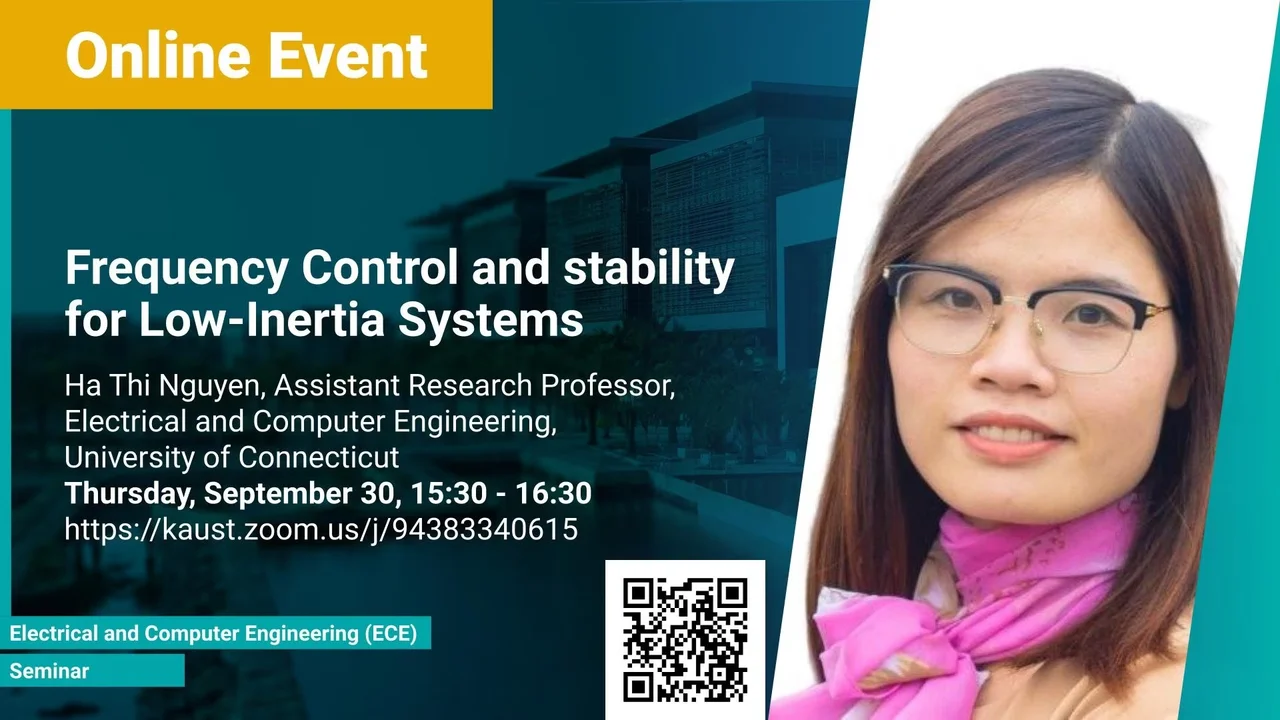
Frequency Control and stability for Low-Inertia Systems
- Ha Thi Nguyen, Assistant Research Professor, Electrical and Computer Engineering, University of Connecticut
KAUST
The rapid penetration of renewable energy sources (RESs) into power systems has introduced many challenges in securing a stable network operation and has forced power systems to operate in low inertia conditions. Low short-circuit power and intrinsic inertial response from converter-interfaced RES may cause poor dynamic performance of systems and render the system frequency more vulnerable than conventional grids. The talk proposes and analyzes different strategies using synchronous condenser (SC), synthetic inertia (SI) of wind power plant, and their combination to enhance the frequency stability of low inertia systems under various scenarios and wind conditions.
Overview
Abstract
The rapid penetration of renewable energy sources (RESs) into power systems has introduced many challenges in securing a stable network operation and has forced power systems to operate in low inertia conditions. Low short-circuit power and intrinsic inertial response from converter-interfaced RES may cause poor dynamic performance of systems and render the system frequency more vulnerable than conventional grids. The talk proposes and analyzes different strategies using synchronous condenser (SC), synthetic inertia (SI) of wind power plant, and their combination to enhance the frequency stability of low inertia systems under various scenarios and wind conditions. The simplified Western Danish power system simulated in real time digital simulator (RTDS) is used as a test system of low inertia to demonstrate the effectiveness of the strategies. The comparative results show that the combination of SC and SI offers a better improvement not only on frequency stability (rate of change of frequency and frequency deviation) but also on the system synchronism under various operating conditions. Additionally, challenges and research opportunities of frequency control in low inertia systems is discussed in the talk.
Brief Biography
Ha Thi Nguyen received the Ph. D. degree in electric power systems from Technical University of Denmark (DTU), Denmark in 2018. She has worked as a Visiting Scholar at the Center Energy Research - University of California, San Diego, and a Postdoc at Electric Power and Energy Center - DTU. She is currently an Assistant Research Professor at Eversource Energy Center – Department of Electrical and Computer Engineering - University of Connecticut (UConn), where she leads the real-time digital simulator (RTDS) power grid testbed and supports research projects related to the integration of renewables in the power grid, cybersecurity, and power grid resilience. Her research interests include power system modelling, operation and control, frequency stability and control for low-inertia systems, renewable energy integration, and geographically distributed power-hardware-in-the-loop simulation